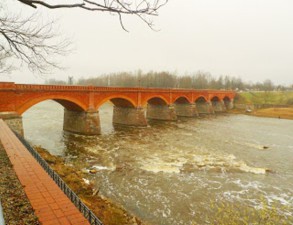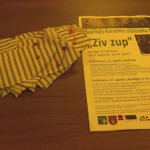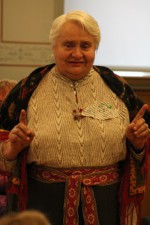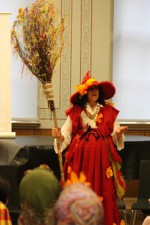Storytelling in Latvia
02/05/2013 - blog
I have just arrived from Riga and I am already missing my Latvian family. This is the first part of a little report about these wonderful days in which I took part in the storytelling festival Ziv Zup.
 25th April
25th April
I arrive to Riga before dark and I am very fortunate to see the sunset above the Baltic Sea before landing. In the airport I see already a familiar face: Guntis Pakalns, who I had the opportunity to meet at the Guadalajara Storytelling Festival. He is one of the organizers of the local festival ZivZup, as well as philologist, folklorist, storyteller and an ardent supporter of oral tradition in his country. He introduces me Inita Šalkovska, a young Latvian storyteller, and Jaak Känd, Estonian storyteller invited to the festival, and we go straight to the car, as we have a long way to Kuldīga, a town in the Kurzeme region, known in Spain as Curlandia, a resounding name that brings me quickly to the world of stories. In the back seat we begin to talk with Inita about folktales, variants, motifs… She is studying folklore at the university and she loves folktales, especially fairy tales. In Latvia cultural tradition is very important and played a key role in keeping Latvian people’s identity during the times of soviet domination. Latvians have done an extraordinary job collecting folksongs, legends and folktales, and the international classification system of folktales is a sort of lingua franca for us. Folklorists make jokes about this, mentioning tales from its typological number instead of the name of the story. I am really bad for numbers, but I was looking over my edition of The Types of International Folktales before coming, searching for stories shared by Spain and Latvia. «Do you know the story ‘The Soup Stone’? » «Of course, we have a variant here as well! » «And what about ‘The Land and Water Ship’? » «No, but I know the story of the world that turned inside out. » «Wonderful! Tell me, please…» They offer me bērzu sula: water of birch tree. It is obtained just these days from birch trees, and it is said it helps the body to prepare for spring. «It has been a long winter and spring is coming very late. » Outside the temperature must be minus something. Who cares! In the car we are in high spirits, and with the conversation we forget the cold and even the notion of time, and we miss our way a couple of times. After some detours, we arrive finally to the Kuldīga hotel ‘Virkas muiža’, a white wooden house, it looks really comfortable. It is past midnight, so we go straight to bed: tomorrow will be a long and intense storytelling day.
 26th April
26th April
At breakfast time, after eating a delicious porridge (putra) with berry marmalade, more stories appear: the hotel password is the name of a lady that fell in love with a stable boy, an impossible love in that time. The legend says that when the lovers tried to escape on horseback they fell into the river and drowned. But Inita said to us that the hotel’s manager and storyteller Inese Šmukste told her that an old German woman that came to the hotel, as she heard the story, said: «No, this is not so, my grandmother told me this story when I was a child, she was from here. The lady and the stable boy married and had five children, but they were excluded from society. Maybe because of that then circulated the story with the tragic end. »
Very interesting… a story that goes and comes back again. This region was under German control during a lot of time, and stories circulated with people. It seems that this town hides a story on every corner. We talk about stories, languages… And I discover that in spite of geographical vicinity, Latvian and Estonian languages are not intercomprehensible. But Guntis has prepared every detail: Agata Babina joins us. She is doing a master in Spanish Studies at the University of Riga and speaks fluently Spanish and English. She will be in charge of translating my stories from Spanish and Jaak’s stories from English.
 We go right away to the Pelči castle, a mysterious building that houses a school for children with special needs. We visit the comfortable children’s library and we discover the numerous hiding places inside the building. No ghost in the castle. But some people said they have seen a white lady wandering around the cemetery nearby. Here in Latvia people love ghost stories, especially kids. In the big hall of the attached building, everyone is waiting for us. The school is frequently visited by storytellers and some children from the school use to tell stories as well, so they offer us a warm welcome. No wonder why this country is called a «singing nation», because they immediately begin to sing along the «bombombom birlibom birlibom» of the story. Agata works hard in order to achieve that stories can be understandable for everyone, and at the end of the session each storyteller receives a beautiful painting from the little artists of the school.
We go right away to the Pelči castle, a mysterious building that houses a school for children with special needs. We visit the comfortable children’s library and we discover the numerous hiding places inside the building. No ghost in the castle. But some people said they have seen a white lady wandering around the cemetery nearby. Here in Latvia people love ghost stories, especially kids. In the big hall of the attached building, everyone is waiting for us. The school is frequently visited by storytellers and some children from the school use to tell stories as well, so they offer us a warm welcome. No wonder why this country is called a «singing nation», because they immediately begin to sing along the «bombombom birlibom birlibom» of the story. Agata works hard in order to achieve that stories can be understandable for everyone, and at the end of the session each storyteller receives a beautiful painting from the little artists of the school.
 We go quickly to the Kuldīga Library, where we have two sessions for kids with local storytellers. Kuldīga is a little city of the regions of Kurzeme where time seems to have stopped. People know each other, they greet each other, and they stop for having a chat. There is a strong feeling of belonging and community here. It was here where 7 years ago, as part of a Grundtvig project, ‘The development of storytelling skills – a European approach’ (2006 – 2008), a storytelling program for young seniors was developed. This program allowed to discover wonderful storytellers and to form a real storytelling community.
We go quickly to the Kuldīga Library, where we have two sessions for kids with local storytellers. Kuldīga is a little city of the regions of Kurzeme where time seems to have stopped. People know each other, they greet each other, and they stop for having a chat. There is a strong feeling of belonging and community here. It was here where 7 years ago, as part of a Grundtvig project, ‘The development of storytelling skills – a European approach’ (2006 – 2008), a storytelling program for young seniors was developed. This program allowed to discover wonderful storytellers and to form a real storytelling community.  We arrive there and stories have just begun, so we join in the group of storytellers. I am fortunate to hear the story of the Mother Water’s daughter (told by Guntis in the Guadalajara Festival and which explains the mystery of flying fish at the Venta River) from Liesma Lagzdiņa, a woman that knows all stories from that region and tells them in her natural and fresh style.
We arrive there and stories have just begun, so we join in the group of storytellers. I am fortunate to hear the story of the Mother Water’s daughter (told by Guntis in the Guadalajara Festival and which explains the mystery of flying fish at the Venta River) from Liesma Lagzdiņa, a woman that knows all stories from that region and tells them in her natural and fresh style. I listen to other storytellers: Ārija Klēvere, Ausma Lūse and Ivita Kalnozola-Kalsere, best known as Pasaku Ragana, «The Fairytale Witch», I will tell you about them later, as I would be able to listen to them many times and in different situations.
I listen to other storytellers: Ārija Klēvere, Ausma Lūse and Ivita Kalnozola-Kalsere, best known as Pasaku Ragana, «The Fairytale Witch», I will tell you about them later, as I would be able to listen to them many times and in different situations. Inita, Jaak and I also tell a story. The story of Jaak and his granddaughter chasing elephants remembers me the summer season spent at my grandparent’s country house, where we imagined fantastic parallel worlds. Inita also tells a funny story and I understand the word putrathat I learned in the morning during breakfast. We go on with stories and even a child tells us a little story. Everyone is preparing itself for earning a bowl of fish soup tomorrow, the festival’s big day.
Inita, Jaak and I also tell a story. The story of Jaak and his granddaughter chasing elephants remembers me the summer season spent at my grandparent’s country house, where we imagined fantastic parallel worlds. Inita also tells a funny story and I understand the word putrathat I learned in the morning during breakfast. We go on with stories and even a child tells us a little story. Everyone is preparing itself for earning a bowl of fish soup tomorrow, the festival’s big day.
 After the storytelling session, we have lunch, and then, as the rain stops, we go to visit the town guided by Liesma, who knows the city inch by inch, story by story. The legend says that a woman gone crazy when her fiancé died suddenly before marriage. Since then, she began to collect cats and forget the rest of the world, and everyone began to call her Katalina (pronounced as kaķis, cat in Latvian). We finish our tour in the waterfall of Venta River, and we see the flying fishes vimba (Vimba vimba in Latin): they jump really high, trying to surpass the little waterfall. After seeing such a thing, it is impossible not to believe in fairy tales. I can tell you one day the story of the daughter from Venta River and the mystery of the flying fishes, but I am not sure that I will do justice to it.
After the storytelling session, we have lunch, and then, as the rain stops, we go to visit the town guided by Liesma, who knows the city inch by inch, story by story. The legend says that a woman gone crazy when her fiancé died suddenly before marriage. Since then, she began to collect cats and forget the rest of the world, and everyone began to call her Katalina (pronounced as kaķis, cat in Latvian). We finish our tour in the waterfall of Venta River, and we see the flying fishes vimba (Vimba vimba in Latin): they jump really high, trying to surpass the little waterfall. After seeing such a thing, it is impossible not to believe in fairy tales. I can tell you one day the story of the daughter from Venta River and the mystery of the flying fishes, but I am not sure that I will do justice to it.
 After an informal talk exchanging experiences about storytelling with a cup of coffee and tea, where I finally meet Māra Mellēna, one of the main promoters of the children folklore movement, we go back to the library, where the representatives of the suiti community have just arrived.
After an informal talk exchanging experiences about storytelling with a cup of coffee and tea, where I finally meet Māra Mellēna, one of the main promoters of the children folklore movement, we go back to the library, where the representatives of the suiti community have just arrived.
 The hall of the library is full. We storytellers offer some stories, suiti women reward us with their chants and everybody begins to laugh to the funny songs, while the recipient of the verses smiles at the jokes. It is difficult to obtain a translation, as no one is able to keep from laughing and translate clearly the meaning. What it seems clear to me is that everyone enjoys irreverent chants, a great example of fusion, and I am happy to see they are still a living tradition, beloved for everyone. I suppose the church won’t be so delighted, but fortunately traditional culture has nothing to do with political correctness. Maybe because of that it has always been treated as something minor and unimportant. But here lays also its strength, its survival in people’s memories.
The hall of the library is full. We storytellers offer some stories, suiti women reward us with their chants and everybody begins to laugh to the funny songs, while the recipient of the verses smiles at the jokes. It is difficult to obtain a translation, as no one is able to keep from laughing and translate clearly the meaning. What it seems clear to me is that everyone enjoys irreverent chants, a great example of fusion, and I am happy to see they are still a living tradition, beloved for everyone. I suppose the church won’t be so delighted, but fortunately traditional culture has nothing to do with political correctness. Maybe because of that it has always been treated as something minor and unimportant. But here lays also its strength, its survival in people’s memories. Then we share a delicious snack: rye bread with different smoked fish, a sort of little bacon pies called pīrāgi, and the famous sklandrauši, delicious carrot pies typical from Kurzeme. I speak with some suiti women, to thank them for her music. «I loved the story of wolf woman too!». Everyone goes to the table to taste all these food delicacies, we toast… I also taste a tea of gaiļbikši, that is cowslip tea (Primula veris in Latin), that means in Latvian ‘cook trousers’, and I am delighted to hear it. Somebody celebrates birthday, and everyone sings in her honour; then people begin to improvise songs for each person. Latvians love improvised singing; the metrics from the dainas, the traditional Latvian songs, are short quatrains, an extremely concise poetic expression full of symbols that allows free combination and improvisation. That makes me think about Homer times, when stories and songs where one. We are at North, on the Baltic shore, but people seems so warm and open, ready to enjoy the good company, as in the Mediterranean sea.
Then we share a delicious snack: rye bread with different smoked fish, a sort of little bacon pies called pīrāgi, and the famous sklandrauši, delicious carrot pies typical from Kurzeme. I speak with some suiti women, to thank them for her music. «I loved the story of wolf woman too!». Everyone goes to the table to taste all these food delicacies, we toast… I also taste a tea of gaiļbikši, that is cowslip tea (Primula veris in Latin), that means in Latvian ‘cook trousers’, and I am delighted to hear it. Somebody celebrates birthday, and everyone sings in her honour; then people begin to improvise songs for each person. Latvians love improvised singing; the metrics from the dainas, the traditional Latvian songs, are short quatrains, an extremely concise poetic expression full of symbols that allows free combination and improvisation. That makes me think about Homer times, when stories and songs where one. We are at North, on the Baltic shore, but people seems so warm and open, ready to enjoy the good company, as in the Mediterranean sea.

 After the performance, the chat goes on: suddenly Liesma discovers I speak German and we have a nice chat. «Here we have stories about wolf men, too. They say that if someone walks under the roots of a tree, he will be transformed in a wolf, and it has to be killed with silver bullets, or he will kill people and ate them.» I say to her that her stories are better than gold. She smiles and says: «Kuldīga was also called Goldingen.» Well, that is for a reason. Ārija joins us: she is a very little and energetic woman that tells witty stories in a very funny style. She speaks also some words in German, and she begins to sing me with Jaak a song «Oh Susanna, Marianna…», she sings the Latvian song and Jaak the Estonian version. Songs and stories together again…
After the performance, the chat goes on: suddenly Liesma discovers I speak German and we have a nice chat. «Here we have stories about wolf men, too. They say that if someone walks under the roots of a tree, he will be transformed in a wolf, and it has to be killed with silver bullets, or he will kill people and ate them.» I say to her that her stories are better than gold. She smiles and says: «Kuldīga was also called Goldingen.» Well, that is for a reason. Ārija joins us: she is a very little and energetic woman that tells witty stories in a very funny style. She speaks also some words in German, and she begins to sing me with Jaak a song «Oh Susanna, Marianna…», she sings the Latvian song and Jaak the Estonian version. Songs and stories together again…
 We go to the car, to the last storytelling session of the day: ghost stories at Kuldīga’s school. But as they saw me yawning, before going to school, they stop at the hotel and send me to bed. «I want to hear the ghost stories», I insist, as a little child. But Guntis, Liesma and Ārija stay firm: they send us both Jaak and me to the hotel. Māra Mellēna also recommended me to go to bed, and she borrowed me a beautiful woollen shawl, traditionally knitted, for the outdoor performance of tomorrow, as they forecasted rain and bad weather. Liesma says that we don’t have to worry: she will sing a song that helps to move away clouds. Hope it will help, because the sky looks pretty bad. I go to bed and as soon I lay down, I fell asleep, exhausted. Tomorrow is the festival’s big day. I hope that Liesma’s chants will work.
We go to the car, to the last storytelling session of the day: ghost stories at Kuldīga’s school. But as they saw me yawning, before going to school, they stop at the hotel and send me to bed. «I want to hear the ghost stories», I insist, as a little child. But Guntis, Liesma and Ārija stay firm: they send us both Jaak and me to the hotel. Māra Mellēna also recommended me to go to bed, and she borrowed me a beautiful woollen shawl, traditionally knitted, for the outdoor performance of tomorrow, as they forecasted rain and bad weather. Liesma says that we don’t have to worry: she will sing a song that helps to move away clouds. Hope it will help, because the sky looks pretty bad. I go to bed and as soon I lay down, I fell asleep, exhausted. Tomorrow is the festival’s big day. I hope that Liesma’s chants will work.
